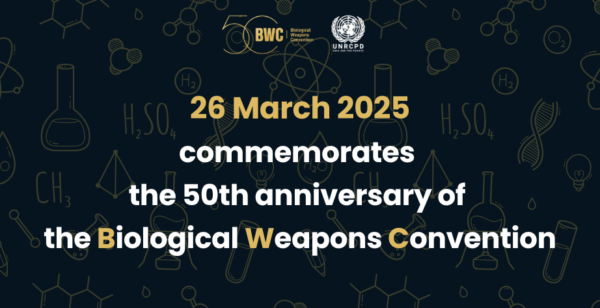
50 Years of the BWC: Strengthening Biological Security in the Asia-Pacific
Biological weapons use disease-causing organisms or toxins to harm or kill humans, animals or plants.They can be deadly and highly contagious causing humanitarian, environmental and economic consequences. Diseases caused by such weapons would not confine themselves to national borders and could spread rapidly around the world, to devastating effect. The consequences of the deliberate release of biological agents or toxins by State or non-State actors could be dramatic. In addition to the tragic loss of lives, such events could cause food shortages, environmental catastrophes, devastating economic loss, and widespread illness, fear and mistrust among the public.
The Biological Weapons Convention (BWC) prohibits the development, production, acquisition, transfer, stockpiling and use of biological and toxic weapons. It currently possesses 188 states parties and 4 signatory states, entering into force in 1975. Ever since, States have met approximately every 5 years to review the operation of the BWC. So far, nine Review Conferences (“RevCons”) have taken place since 1980. Now, on the 50th anniversary of its entry into force, the significance of the BWC and the need to enhance its implementation is gaining momentum in the international community.
Given the rapidly changing advances in bio-technology, specifically so-called “dual-use” systems that can create both medical products and biological agents, the potential biological weapons capabilities of States and non-State actors have increased dramatically. For this reason, the United Nations Office for Disarmament Affairs (UNODA), through its BWC Implementation Support Unit (ISU) and the United Nations Regional Center for Peace and Disarmament in Asia and the Pacific (UNRCPD), has been resolute in its support to enhance the implementation of the BWC across the Asia-Pacific.
In January 2024 UNODA organized a regional workshop on achieving universalization of the BWC in the Asia Pacific in Brisbane, Australia, in cooperation with the Australian Department of Foreign Affairs and Trade (DFAT). In the region there are currently three states, the Federated States of Micronesia, Kiribati and Tuvalu, who have yet to join the Convention, with the latter two states participating in the workshop. Participants were given the benefits and responsibilities deriving from the BWC, as well as the necessary legal procedures for joining it and the key aspects of national implementation. It highlighted UNODA’s commitment to sharing best practices and lessons learned, facilitating regional dialogue on the BWC in the region. Further efforts included a series of videos commemorating the Convention’s 45th anniversary in 2021, as well as those highlighting female champions in the biosecurity field.
Furthermore, in August 2023 UNODA’s BWC-ISU and its Regional Office for Asia-Pacific, UNRCPD, hosted a subregional workshop on the Convention’s implementation in Kathmandu, Nepal, in cooperation with Nepal’s Ministry of Foreign Affairs and with the support of the Government of the United Kingdom and the European Union. This event included 49 representatives from diverse backgrounds and organizations to receive presentations on biotechnology developments, biohazard threat reduction, the role of youth in biosecurity, requirements for Confidence Building Measures (CBM’s) and the wider opportunities and challenges facing the Convention in the Asia-Pacific.


This was followed more recently in October 2024 by UNRCPD/BWC-ISU’s support to the organization of the Regional Workshop on Implementing the Biological Weapons Convention and Promoting Biosafety and Biosecurity in Southeast Asia, hosted in Shenzhen, China, by the governments of China and Lao PDR. Drawing 35 participants from ASEAN Member States and Timor-Leste, it covered the Convention’s framework, learned experiences from ASEAN Member States, emerging biosecurity trends, existing cooperation mechanisms and shared agreements on furthering national cooperation in the region on BWC implementation. Delivered through presentations, Q&A’s and practical exercises, the event underscored the critical importance of inter-State cooperation and the development of close partnerships across governmental and scientific fields.

Most recently, UNRCPD and the BWC-ISU also supported the 23rd Republic of Korea – United Nations Joint Conference on Disarmament and Non-Proliferation Issues in Seoul, Republic of Korea in November 2024. Topically focusing on strengthening the BWC, the conference emphasized the urgency of fortifying global biosecurity frameworks to address both existing and emerging biological risks, all delivered to a group of 100 policymakers, youth ambassadors and experts in the field. It underscored the significance of international collaboration in ensuring that biological technologies contribute to global well-being while mitigating potential threats. Comprising eight sessions, the joint conference covered a range of themes from emerging risks, preparedness and response capabilities, verification and compliance mechanisms to wider regional priorities in the Asia-Pacific.


Significant progress has been made as the BWC becomes half a century old, but much more is still to come. As identified in the 23rd ROK-UN Joint Conference, enhanced interdisciplinary collaboration is needed to address existing and future challenges. Just as important are the requirements for increased youth engagement and innovation, alongside the use of existing platforms such as the ASEAN + 3 or the East Asia Summit to develop a much deeper regional environment of biosecurity collaboration and capacity building. In a world characterized by rapid technological change, the universalization and further implementation of the BWC is a not just a regional, but a global necessity. Through these events and initiatives, UNODA has demonstrated its commitment to support the strengthening this vital Convention across the region, and to promote the active engagement of Asia-Pacific States at the on-going global discussions of the Working Group on Strengthening the BWC, established by the Ninth Review Conference of the BWC in Geneva. By taking necessary action now, with diverse insights and expertise from all its stakeholders, the Asia-Pacific can secure a safe, more secure future in biological security and beyond.

